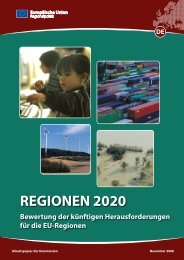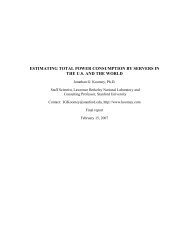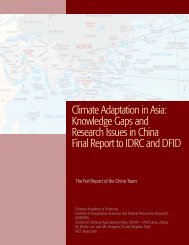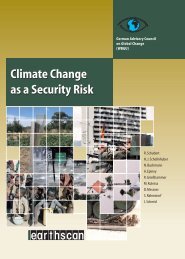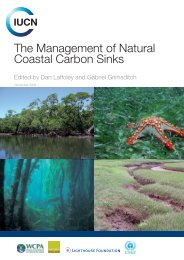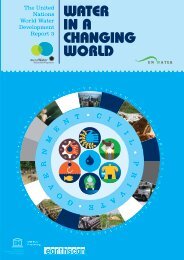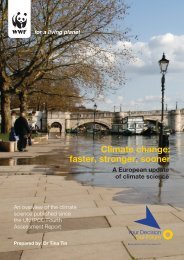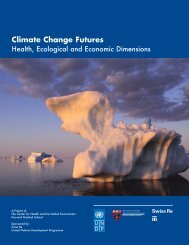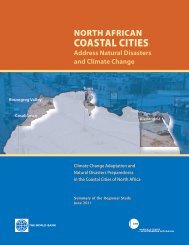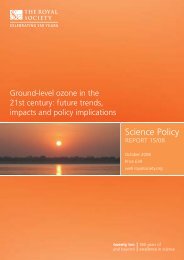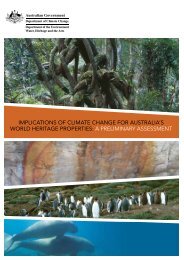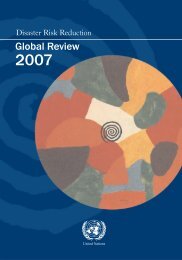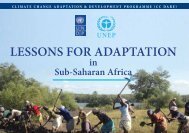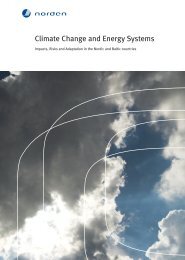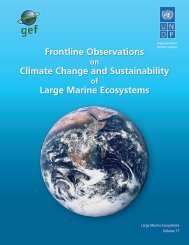Climate Change in Latin America - European Commission
Climate Change in Latin America - European Commission
Climate Change in Latin America - European Commission
You also want an ePaper? Increase the reach of your titles
YUMPU automatically turns print PDFs into web optimized ePapers that Google loves.
1.4.3. Networks<br />
RIOCC - The Ibero-<strong>America</strong>n Network of <strong>Climate</strong><br />
<strong>Change</strong> Offices is formed by a commission of<br />
coord<strong>in</strong>ators, made up of the directors of the<br />
21 <strong>Climate</strong> <strong>Change</strong> Offices <strong>in</strong> the member states 14 .<br />
The Director-General of the Spanish <strong>Climate</strong> <strong>Change</strong><br />
Office acts as the head coord<strong>in</strong>ator.<br />
The aim of this Network is to serve as a tool that<br />
l<strong>in</strong>ks the Ibero-<strong>America</strong>n countries together <strong>in</strong> order<br />
to make <strong>Climate</strong> <strong>Change</strong> part of political dialogue<br />
at the highest level, as well as to give an impulse to<br />
strategies <strong>in</strong>volv<strong>in</strong>g susta<strong>in</strong>able development and a<br />
low carbon economy, and the identification of common<br />
problems and solutions on the subject of the<br />
impact of and vulnerability and adaption to <strong>Climate</strong><br />
<strong>Change</strong>. The RIOCC works under the supervision<br />
of Ibero-<strong>America</strong>n M<strong>in</strong>isters of the Environment, to<br />
whom it also reports. In turn, the M<strong>in</strong>isters present<br />
the RIOCC's most relevant conclusions to the<br />
Ibero-<strong>America</strong>n Summit, thereby guarantee<strong>in</strong>g<br />
political support. Most of the RIOCC's efforts and<br />
work have focused on adaptation, which has led to<br />
the establishment of the so-called Ibero-<strong>America</strong>n<br />
Programme for the Evaluation of <strong>Climate</strong> <strong>Change</strong><br />
Impacts, Vulnerability and Adaptation (PIACC).<br />
The Araucaria XXI programme is a Spanish Cooperation<br />
<strong>in</strong>strument for the protection of the environment<br />
and susta<strong>in</strong>able development <strong>in</strong> Ibero-<strong>America</strong>n.<br />
It provides support to the PIACC, to the Clean<br />
Development Mechanism and to the strengthen<strong>in</strong>g of<br />
capabilities and the promotion of dialogue with the<br />
region and the participat<strong>in</strong>g <strong>in</strong>stitutions, through their<br />
"<strong>Climate</strong> <strong>Change</strong>" activity programme. The follow<strong>in</strong>g<br />
projects that have been identified and promoted<br />
by the Network are worth mention<strong>in</strong>g: project to<br />
evaluate the level of vulnerability of mar<strong>in</strong>e coastal<br />
areas to <strong>Climate</strong> <strong>Change</strong>; the cooperative project<br />
on <strong>Climate</strong> <strong>Change</strong> mitigation and adaptation for<br />
susta<strong>in</strong>able forest management <strong>in</strong> Ibero-<strong>America</strong> (the<br />
MIA - TroFCCA - FORMA projects also benefit from<br />
support from the EU), run by CATIE, Brazil's tra<strong>in</strong><strong>in</strong>g<br />
proposal for the use of regional modell<strong>in</strong>g systems;<br />
the support project for Paraguay's National <strong>Climate</strong><br />
<strong>Change</strong> Office and the pilot humanitarian aid project<br />
for the reduction of social-environmental vulnerability;<br />
and improvements to <strong>Climate</strong> <strong>Change</strong> adaptation <strong>in</strong><br />
Central <strong>America</strong> (AECI - Araucaria XXI Projects).<br />
ACCLAC - The Alliance for <strong>Climate</strong> <strong>Change</strong><br />
Mitigation and Adaptation and Risk Management<br />
<strong>in</strong> Lat<strong>in</strong> <strong>America</strong> and the Caribbean is funded<br />
by the Tropical Agricultural Research and Higher<br />
Education Centre (CATIE), the German Cooperation<br />
Agency (GTZ), The Inter-<strong>America</strong>n Institute for<br />
Cooperation on Agriculture (IICA), The Tropic Forest<br />
Foundation (TTF) and the University for International<br />
Cooperation (UCI). Itis an organisation whose aim is to<br />
carry out activities to promote ecological awareness<br />
and justice, as well as access to <strong>in</strong>struments that<br />
make it possible to mitigate and adapt to <strong>Climate</strong><br />
<strong>Change</strong>. They aim to achieve this through the active<br />
participation of the greatest possible number of<br />
agents (central and local governments; bus<strong>in</strong>ess<br />
organisations and all social activists). They act across<br />
the board <strong>in</strong> each region and part of their projects<br />
<strong>in</strong>cludes facilitat<strong>in</strong>g and empower<strong>in</strong>g dialogue,<br />
creative activities and the spread of knowledge<br />
amongst the different agents (the systematisation<br />
of experience with mitigation and adaptation and<br />
the development of <strong>Climate</strong> <strong>Change</strong> models and<br />
scenarios for agriculture).<br />
RIMD - The Inter-<strong>America</strong>n Network for Disaster<br />
Mitigation was set up by the Department of Susta<strong>in</strong>able<br />
Development (DSD/OAS) with the support from<br />
the Canadian International Development Agency<br />
(CIDA), as a permanent mechanism <strong>in</strong> the hemisphere<br />
to strengthen practical collaboration between <strong>in</strong>tergovernmental<br />
agencies on the subject of disaster<br />
reduction. It particularly focuses on the exchange of<br />
technical <strong>in</strong>formation and good practices, as well as<br />
provid<strong>in</strong>g support for the monitor<strong>in</strong>g and review of the<br />
Inter-<strong>America</strong>n Strategic Plan for Policies on Reduc<strong>in</strong>g<br />
Vulnerability, Manag<strong>in</strong>g Risk and Respond<strong>in</strong>g to<br />
Disasters (IASP), so that the progress and lessons<br />
learnt by different national and regional strategies<br />
may be taken <strong>in</strong>to account.<br />
EIRD - Through its Regional Office for the <strong>America</strong>s,<br />
the International Strategy for Disaster Reduction<br />
promotes jo<strong>in</strong>t and coord<strong>in</strong>ated action to reduce<br />
socio-economic, humanitarian and development<br />
disasters, and offers support <strong>in</strong> the <strong>in</strong>tegration of<br />
different policies on the matter. They also work with<br />
broadcast<strong>in</strong>g <strong>in</strong>formation on the subject of disaster<br />
reduction. They run awareness campaigns and<br />
produce articles, promotional material, magaz<strong>in</strong>es<br />
and publications related to disaster reduction.<br />
14 Argent<strong>in</strong>a, Bolivia, Brazil, Chile, Colombia, Costa Rica, Cuba,<br />
Ecuador, El Salvador, Spa<strong>in</strong>, Guatemala, Honduras, México,<br />
Nicaragua, Panamá, Paraguay, Peru, Portugal, the Dom<strong>in</strong>ican<br />
Republic, Uruguay and Venezuela.<br />
25



